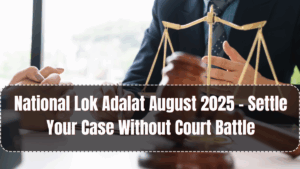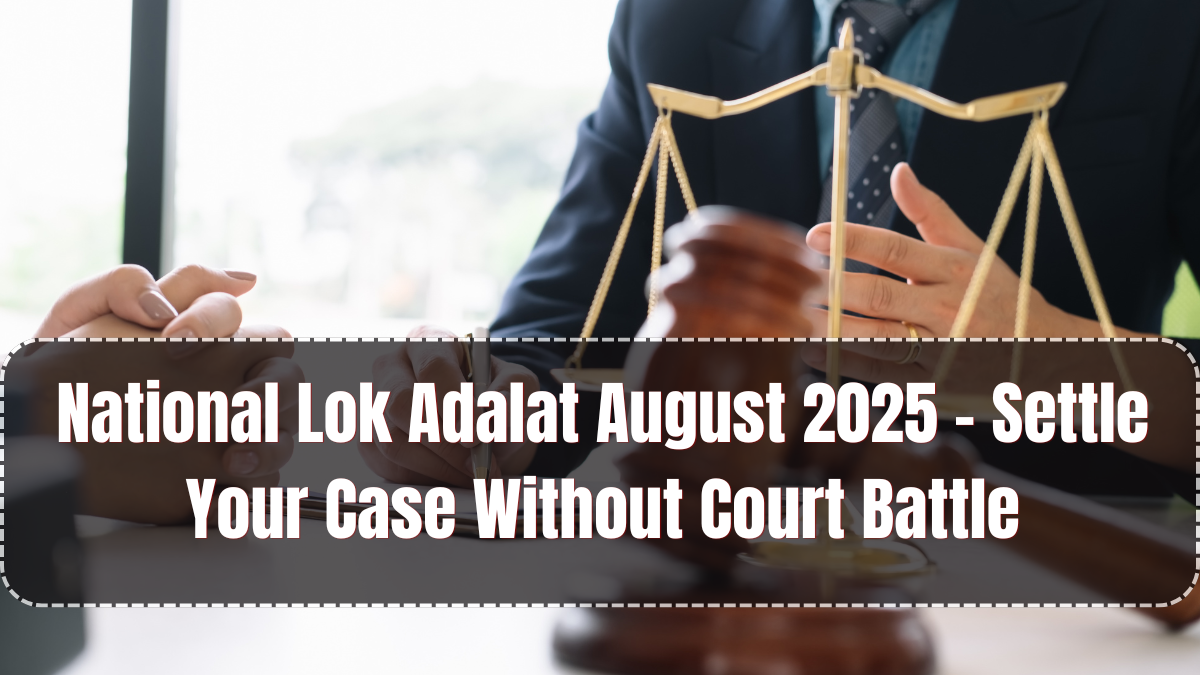India’s legal system is known for its delays and backlogs, but there is a fast, effective, and free way to settle your case — the National Lok Adalat. Scheduled for August 10, 2025, this nationwide legal drive aims to resolve thousands of pending and pre-litigation disputes across all states in a single day. The event is coordinated by the National Legal Services Authority (NALSA) in partnership with State Legal Services Authorities (SLSAs) and district courts.
This article covers the lok adalat schedule, types of cases eligible for quick resolution, how to participate, and what benefits it offers to ordinary citizens.

What Is Lok Adalat?
Lok Adalat, meaning “People’s Court,” is an alternative dispute resolution mechanism where cases are settled amicably with mutual consent, outside the traditional courtroom setting. These courts are organized periodically to resolve civil and compoundable criminal matters quickly and fairly, without the procedural delays of regular litigation.
The settlement has the same legal standing as a regular court decision and is binding on both parties, with no further appeal allowed.
August 2025 National Lok Adalat – Key Details
-
Date: Saturday, August 10, 2025
-
Time: 10:00 AM onwards
-
Location: All District Courts, Taluk Courts, and Nyaya Panchayats across India
-
Organizer: NALSA + SLSAs
-
Mode: Physical and virtual benches in some states
This year’s event aims to resolve over 20 lakh cases, including pending matters and fresh pre-litigation disputes.
Which Cases Are Eligible?
The National Lok Adalat 2025 is accepting a broad range of disputes that are compoundable and suited for out-of-court settlements. Eligible case types include:
-
Bank recovery matters (credit card dues, loans, EMIs)
-
Motor Accident Claims Tribunal (MACT) cases
-
Family disputes (divorce, alimony, child custody if mutually agreed)
-
Cheque bounce cases under Section 138 of the NI Act
-
Consumer disputes
-
Land/property boundary issues
-
Public utility bills (water, electricity)
-
Labour disputes
-
Compoundable criminal offences
Cases that are already in court or at pre-litigation stage can both be submitted for hearing.
How to Submit a Case to Lok Adalat
Anyone with an eligible dispute can submit their case for Lok Adalat hearing in the following way:
-
Contact Your District Legal Services Authority (DLSA)
Visit the court complex and fill a submission form. You can also approach the Legal Aid Help Desk for assistance. -
Consent from Both Parties
Settlement can happen only if both the parties agree to it voluntarily. You may be asked to sign a joint consent letter. -
Verification & Listing
The case is verified and listed on the Lok Adalat cause list for August 10, 2025. You will be notified of your slot in advance. -
Attend the Hearing
Appear in person or virtually (if your court supports it). The judge will help mediate a compromise between the two parties. -
Settlement Certificate Issued
Once settled, a final award is issued and recorded — this is equivalent to a court decree and cannot be appealed.
You can also approach your bank, insurance company, or utility board and request them to submit your case to Lok Adalat for settlement.
Why Should You Opt for Lok Adalat?
-
No court fees required — it’s completely free
-
Fast-track settlement — often within minutes
-
No lawyer mandatory
-
Confidential and non-adversarial process
-
Binding and final decision
-
Helps reduce long-pending litigation and restore harmony between parties
In many loan-related matters, banks even offer up to 50% interest or penalty waivers during Lok Adalat settlements.
Participating States and Digital Access
States like Maharashtra, Karnataka, Uttar Pradesh, Gujarat, Tamil Nadu, and Delhi will have both physical and online benches. Some are even accepting WhatsApp-based settlement consent for pre-listed disputes.
Use your state’s SLSA website or the NALSA portal to track your case status or download the final award after August 10.
Common Documents Required
-
Aadhar card or any photo ID
-
Copy of complaint or legal notice
-
Utility bills or loan account statement (if applicable)
-
Joint application form (for mutual cases)
-
Any previous settlement attempts or orders
Make sure all parties are available on the date of hearing, either in-person or via video conferencing, to avoid delays.
FAQs
Is the Lok Adalat settlement legally binding?
Yes, once both parties sign the agreement and the bench issues the award, it is legally binding and cannot be appealed in higher courts.
Do I need a lawyer to attend Lok Adalat?
No. You can appear on your own. However, if you want legal advice, you may contact the free legal aid lawyer available at the court.
What if the other party does not agree to compromise?
Then the case cannot be settled via Lok Adalat. It will continue in the regular court where it was originally filed.
Can I settle my traffic challan or fine through Lok Adalat?
Yes, in many cities, minor traffic fines and e-challans can be settled in Lok Adalat. Check with your city’s traffic department or DLSA.
Is there any fee for filing a case in Lok Adalat?
No. No fees or court charges are levied. If you had paid earlier, it will be refunded upon successful settlement.
Click here to know more.
